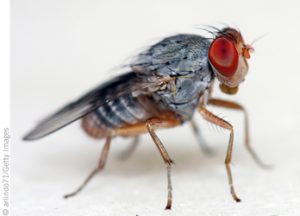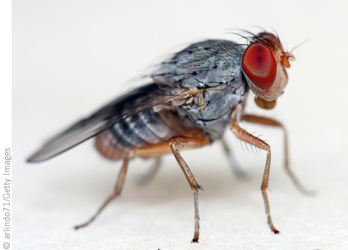 New research published in the Journal of Food Protection shows that fruit flies are capable of spreading illness—inducing bacterial pathogens to both food and food preparation surfaces. Prior to the study, fruit flies were simply viewed as a nuisance at food-handling establishments.
New research published in the Journal of Food Protection shows that fruit flies are capable of spreading illness—inducing bacterial pathogens to both food and food preparation surfaces. Prior to the study, fruit flies were simply viewed as a nuisance at food-handling establishments.
The study was the first to demonstrate that fruit flies can transfer E. coli, Salmonella, and Listeria to surfaces and relocate bacteria from a contaminated source to fresh, ready-to-eat food. “The results weren’t that surprising, however, knowing that common vermin such as house flies, cockroaches, and rodents are known to carry and transfer disease pathogens,” says John Barcay, PhD, one of the senior scientists at Ecolab Inc. in Eagan, Minn., who conducted the study.
Fruit flies can enter establishments in deliveries of food items, especially fruits and vegetables and from the outdoors in warmer climates. They are particularly attracted to yeast, alcohol, and vinegar odors. Ecolab’s data indicates that fruit flies are present in more than 50 percent of all North American restaurants.
Addressing Infestations
The most important part of fruit fly control is finding the source of the adult flies—meaning the organic matter where their larvae are feeding and developing, says Angela Tucker, PhD, manager, technical services, Terminix International Co., LP, Memphis, Tenn. If an adult population is large, a health inspector might fine the facility.
If a restaurant has a fruit fly infestation, Dr. Barcay recommends proper cleaning and sanitizing to disrupt the breeding potential. “All fruit flies require is moisture and fermenting organic material to breed and feed in,” he says. “Keeping equipment in good repair and minimizing water and beverage leaks are also key to removing the conditions conducive to fruit flies.”
Preventing Infestations
To prevent an infestation, Glen Ramsey, a board-certified entomologist who is a technical services manager at Orkin Pest Control, Atlanta, Ga., says food establishments should store fruits and vegetables properly, purchase produce as needed for quick use, and don’t allow produce to over ripen. Quickly clean up food spills, clean trashcans regularly, and maintain drains to prevent sludge buildup. Employ preventative maintenance measures to structures such as sealing doors, fixing cracked pipes, and repairing floor tiles to lessen entry points and breeding sites.
Dr. Tucker advises food production and food service professionals to inspect incoming packages. “Look for food that is already spoiled or has flies on or in the packages,” she says.
Develop and maintain a cleaning schedule that includes hard-to-reach locations such as under stoves, refrigerators, prep stations, baseboards, and other locations where organic matter may fall and start to decay, Dr. Tucker says. Keep soiled linens and uniforms in tightly closed bags.
Properly cover and seal foods that are no longer in their original containers or have been opened, and promptly throw away spoiled food. Keep dumpsters far away from the door. Ensure that any lights are placed in an area where they do not draw insects into the structure, Dr. Tucker adds.
Each fruit fly female can lay hundreds of eggs in her lifetime, and since they have a short life cycle, an infestation can grow very quickly if not resolved. “Therefore, it is imperative that restaurant managers partner with a reputable pest service provider that is licensed, certified, and knowledgeable about fruit flies’ biology and habits,” Dr. Barcay says. “They will perform an inspection to identify breeding sites and conducive conditions and will make corrective action recommendations to address the issue.”



Leave a Reply